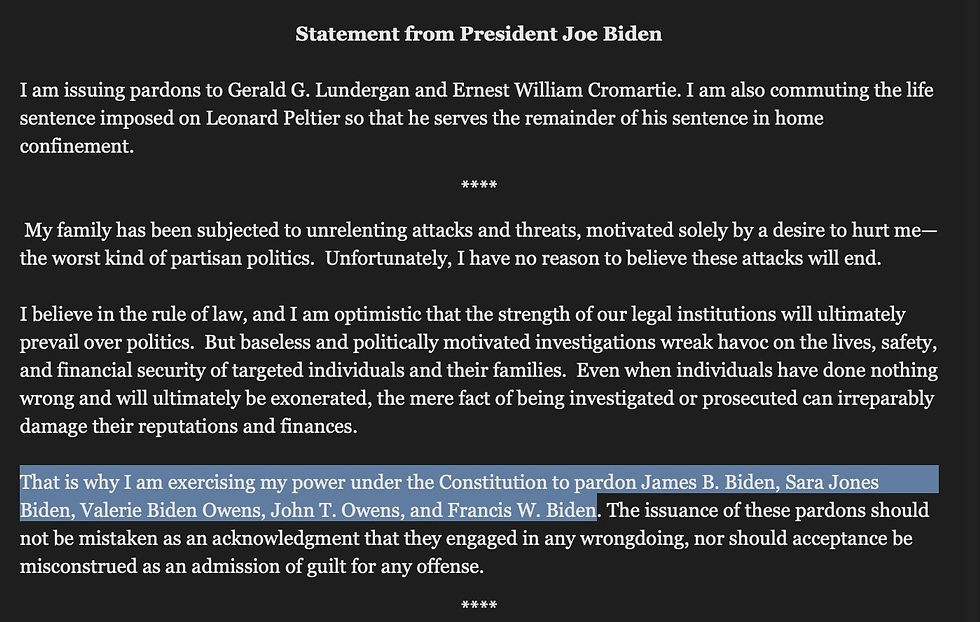Biden's Farewell Fireworks: Family Pardons Ignite Political Firestorm
- Lynn Matthews
- Jan 20
- 3 min read
Updated: Jan 20
Biden’s Preemptive Pardons: Legal Shield or Political Fallout?
In a controversial final act, President Joe Biden issued preemptive pardons to family members and key political figures, igniting a debate on whether this move serves as a legal shield or heralds political fallout While this exercise of presidential power is legally binding, it raises significant questions about its long-term implications. Here's an in-depth look at what these pardons mean and what could happen next.

The Scope of Biden’s Pardons
President Biden’s pardons cover federal offenses committed by his family members and other high-profile figures such as Dr. Anthony Fauci, General Mark Milley, and members of the January 6th Select Committee. These actions aim to shield them from prosecution during an administration led by President Donald Trump, who has promised to pursue legal action against his political adversaries.
For Biden’s family members, the pardons specifically address nonviolent offenses committed between January 1, 2014, and the date of the pardon. While the exact nature of any alleged crimes remains speculative, critics have long targeted the Biden family for alleged business dealings and ethical concerns.
Legal Implications
1. Federal Protections
The preemptive nature of the pardons grants immunity from federal prosecution for covered offenses. Legally, these pardons are airtight under the Constitution's Article II, Section 2.
Historical Precedent: The U.S. Supreme Court upheld the validity of broad pardons in cases like Ford’s pardon of Nixon, signaling a high threshold for challenging these acts.
Investigations Still Possible: Pardons do not necessarily stop federal investigations. Agencies like the FBI or IRS can continue to investigate Biden family members for related matters or for offenses outside the pardon’s scope.
While the Supreme Court has upheld broad pardons, public and political criticism of such actions can still be significant.
2. State-Level Vulnerability
The pardons do not extend to state crimes. Any allegations involving state law — such as financial misconduct, fraud, or violations of state business regulations — remain fair game for prosecutors.
New York and Delaware Focus: These states, where many Biden family dealings reportedly took place, may see increased attention from state attorneys general.
3. Political Precedent
This move sets a striking precedent for the use of preemptive pardons, particularly for close relatives of a sitting president. Critics argue it could normalize self-serving uses of presidential power, eroding public trust.
Political Ramifications
1. Backlash from the Trump Administration
President Trump has signaled that he intends to investigate Biden’s actions as part of his broader push for accountability in government. Congressional Republicans are likely to launch oversight hearings into the circumstances surrounding the pardons.
Investigative Focus: While Congress cannot undo the pardons, it could probe potential conflicts of interest, lobbying efforts, or hidden motivations.
2. Damage to Biden’s Legacy
Biden’s legacy as a president seeking unity may be tarnished by perceptions of favoritism and corruption. Even supporters of Biden may view the pardons as unnecessary or overly protective.
3. Fuel for Trump’s 2024 Agenda
The pardons provide Trump with potent political ammunition. He can frame them as an example of "the swamp protecting itself," reinforcing his message of rooting out corruption in Washington.
Potential Consequences for Investigative Efforts
1. Enhanced Scrutiny
State attorneys general and independent watchdogs may feel emboldened to pursue cases against Biden family members. The pardons could spark renewed interest in exploring whether the family engaged in unethical or illegal activities.
2. Possible Loopholes in the Pardons
Although broad, the pardons do not cover unknown offenses committed outside the specified timeframe. If new evidence emerges, it could lead to criminal charges or civil lawsuits.
3. Strategic Response by Trump’s DOJ
The incoming Trump administration could establish special task forces or appoint special prosecutors to investigate matters related to Biden and his associates. While pardons cannot be revoked, investigations could focus on any offenses not covered by the pardon.
Public Perception: Shielding Allies or Avoiding Justice?
The American public remains deeply divided on the issue. Supporters argue Biden acted out of necessity, given the charged political environment and threats of retaliation. Critics, however, see it as an abuse of power that shields allies from accountability.
Final Thoughts
Biden’s pardons will undoubtedly reverberate through the legal and political landscape for years to come. While they offer immediate protection to their recipients, they also open the door to prolonged scrutiny and criticism. The ultimate impact will depend on how President Trump’s administration and other political actors choose to navigate this complex and contentious issue.


Kommentare